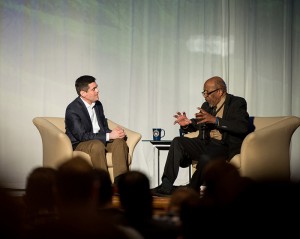by Tom Strode
NASHVILLE (BP) — The Gospel of Jesus is the solution to America’s racial divisions, speakers said on the opening day of a Southern Baptist-sponsored leadership summit.
Black, white and Hispanic pastors and leaders addressed the issue of racial reconciliation Thursday (March 26) at the event conducted by the Ethics & Religious Liberty Commission (ERLC) in Nashville. The summit -– titled “The Gospel and Racial Reconciliation” –- will conclude Friday night.
Longtime civil rights leader John Perkins told the audience of about 500, “I think that we are putting reconciliation back where it belongs — within the Gospel itself.”

John M. Perkins (right) is interviewed by Russell Moore on “The Civil Rights Movement after 50 Years” during the Ethics & Religious Liberty Commission’s “Gospel and Racial Reconciliation” summit. Photo by Alli Rader
People make a “big mistake” in pushing “reconciliation out of the Gospel,” out of being a part of conversion that is understood as a Christian is discipled, Perkins said in an interview with ERLC President Russell Moore.
There is “no room in the Gospel that minimizes its power [to reconcile],” he said. “That’s supposed to be that ongoing miracle. They will know we are Christians by our love.
“I want to preach a gospel that is stronger than my black interests,” said Perkins, founder of the Christian Community Development Association. “I want to preach a gospel that is stronger than my economic interests. I want to preach a gospel that can burn through these racial barriers and bring blacks and whites into the Kingdom.”
Perkins, 84, returned in 1960 to his native Mississippi after his conversion to Christ while living in California.
He “went back not looking for the civil rights movement,” Perkins said. “It was beginning, but I went back there really believing that the Gospel could burn through racial and cultural barriers and even reconcile us to God.”
Probably the best way for racial reconciliation to be addressed from a Gospel perspective, Perkins told attendees, “is to develop multi-cultural churches and be absolutely intentional.”
“I don’t think we can go back,” Perkins said. “I think it’s too clear. We held down the truth in order to practice bigotry….
“And if we go back, it’s going to be an absolute shame, because it means we didn’t live by faith.”
Moore sees ‘another chance’
Speaking on the second anniversary of his election as ERLC president, Moore said Christians must realize racial reconciliation is about the Gospel.
“The reason that we are here today is that these are not simply cultural issues, although they are. These are not simply political issues, although they are. These are not simply social issues, although they are. Above everything else, these are Gospel issues,” Moore said.
“The Gospel is a matter of our adoption as children of God. It’s a matter of God ripping us out from one kingdom [and putting us] into another kingdom.”
The ERLC announced in December it was changing the theme of its 2015 leadership summit from pro-life ethics to racial reconciliation in the wake of grand jury decisions in the police killings of black men that provoked widespread protests and a nationwide discussion. The shift in plans followed refusals by grand juries in St. Louis County and New York City to indict police officers in the high-profile deaths of African American men.
It appears God is “giving us another chance to get this right, but in order to do that, we must repent, not just rebrand,” Moore told the audience.
Moore addressed the Southern Baptist Convention’s history, noting this year is the 20th anniversary of the SBC’s racial reconciliation resolution. That 1995 statement expressed repentance for the convention’s past racism and asked African Americans for forgiveness.
“We baptized the Southern way of life full immersion,” Moore said. “That’s still here with us, and I’m not just talking about the people whose bedsheets have eye holes.
“We are not the state church of the Confederate States of America. And the cross and the Confederate battle flag cannot coexist without one setting the other on fire.”
While there are things worth conserving, Moore said, “If what we are conserving is 1950s Dixie, then we’re conserving something other than the Gospel of Jesus Christ. And we will be fighting God, and we will not win.”
Speaking from Ephesians 3:1-13, Moore said the mystery being unveiled in that passage is not only “a Gospel that you hear but a Gospel that you see.”
The apostle Paul isn’t calling in Ephesians 3 for Jewish churches and Gentile churches, he said.
Paul is saying “the church is a living representation of the Kingdom of God,” Moore said. “If you want to know what the Kingdom looks like, you ought to be able to see it within the church. The Kingdom of God is not about coexistence. The Kingdom of God is about reconciliation. And that reconciliation is within the church.
“The problem is that Sunday morning when we are signifying to the rest of the world, ‘Here is a picture of the Kingdom of God,’ we gather with the same people we would gather with if Jesus Christ were still dead,” Moore said.
‘Not asking you to like soul music’
Dallas megachurch pastor Tony Evans told summit attendees that the content of the Gospel is the death and resurrection of Jesus, but the Gospel “has more than content. It has scope.”
“The Gospel that saves changes how you function, because in saving you, He took the differences and made them part of one body,” Evans said. “So when you split the body illegitimately, you have offended the Gospel and you have kicked the truth in the teeth.”
Evans, preaching on Jesus’ encounter with the woman at Jacob’s well in John 4, said Christ reversed 800 years of racial discord between Jews and Samaritans in less than 24 hours. Jesus did not permit the racism of His Jewish disciples to thwart His purpose of converting the woman and other Samaritans to Himself that day, Evans said.
“Jesus didn’t stop being who He was to reach someone else. He didn’t fake it to make it,” he said, but “He was willing to put his Jewish lips to her Samaritan cup.”
Evans told the audience, “God wants you to embrace your uniqueness for the purposes of His Kingdom, not to deny it.
“God is not asking you to like soul music, and thank God He is not asking me to like country and western.
“God is not asking you to be me or me to be you. He’s just saying both of us need to be like Him,” said Evans, senior pastor of Dallas’ Oak Cliff Bible Fellowship and president of the national ministry The Urban Alternative.
The church in America has permitted “an illegitimate division that has kept God at bay,” Evans said. “God will not function in an environment of disunity, because it is against His nature” as the Trinity.
“[O]ur illegitimate division along racial, class and cultural lines is saying, ‘God stay away,’ even though we are inviting Him to come.”
At the close of the opening message of the summit, Moore invited attendees to the front to pray for racial reconciliation. Most of the audience knelt at the front or in the aisles of LifeWay’s Van Ness Auditorium to pray.

A panel discussion on “Key Issues in Racial Reconciliation: Poverty, Fatherlessness, Criminal Justice and Urban Ministry” featured (from left) Walter Strickland, Dhati Lewis, Kevin Smith, Tony Evans and Dean Inserra during the “Gospel and Racial Reconciliation” summit sponsored by the SBC’s Ethics & Religious Liberty Commission. Photo by Alli Rader
Other speakers March 26 were H.B. Charles, pastor of Shiloh Metropolitan Baptist Church in Jacksonville, Fla.; Robert George, professor of jurisprudence at Princeton University; and Daniel Akin, president of Southeastern Baptist Theological Seminary.
Panels on the first day discussed the state of racial reconciliation in the country; issues such as justice and urban ministry; and multi-ethnic ministry.
The first ERLC Leadership Summit, held in April 2014, was on the Gospel and sexuality.
Tom Strode is the Washington bureau chief for Baptist Press.
Reprinted from Baptist Press (www.baptistpress.com).
Baptist Press (BP) is the official news service of the Southern Baptist Convention and provides news to the 42 state Baptist papers. BP reports on missions, ministry and witness advanced through the Cooperative Program and on news related to Southern Baptists’ concerns nationally and globally.







